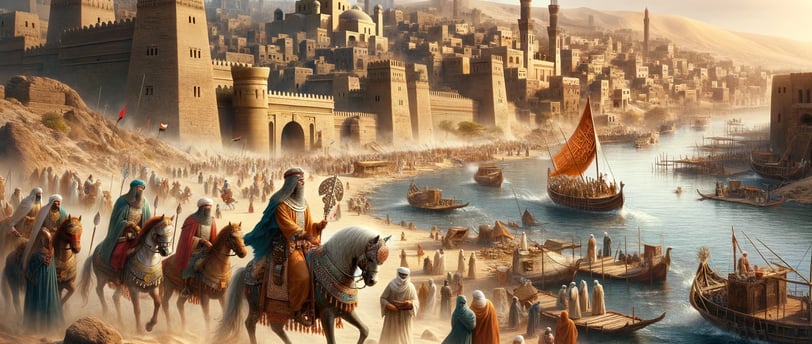Islamic Conquest - A Global Historical Perspective
This is a course outline. This course offers a comprehensive exploration of the Islamic Conquests, delving into their historical context, significant events, and enduring impact. It is designed to provide students with a deep understanding of the rise and spread of Islam, the key figures and events that shaped history, and the social, cultural, and economic transformations brought about by these conquests.
ISLAMIC HISTORYCURRICULUM
12/25/20242 min read


Module 1: Introduction to Islam and the Early Muslim Community
Overview of Islam: Basic principles, Prophet Muhammad, and the early Muslim community.
Sources:
"سيرة ابن هشام" (The Life of Muhammad) by Ibn Hisham [1].
"المبتدأ والمبعث والمغازي" (The Beginning and the Mission and the Battles) by Muhammad bin Ishaq [1].
Module 2: The Conquest of Arabia (632-633 CE)
Key Events: Death of Prophet Muhammad, the Ridda Wars, and the unification of Arabia under Abu Bakr.
Sources:
"البداية والنهاية" (The Beginning and the End) by Ibn Kathir [2].
"تاريخ الطبري" (The History of al-Tabari) by al-Tabari [3].
Module 3: The Conquest of the Middle East (633-651 CE)
Key Events: Conquests of Syria, Palestine, Iraq, and Persia.
Significant Figures: Khalid bin al-Walid, Amr ibn al-As, Sa`d ibn Abi Waqqas.
Sources:
"تاريخ الطبري" (The History of al-Tabari) by al-Tabari [3].
"البداية والنهاية" (The Beginning and the End) by Ibn Kathir [2].
Module 4: The Conquest of North Africa and Spain (647-711 CE)
Key Events: Conquests of Egypt, the Maghreb, and the Iberian Peninsula.
Significant Figures: Amr ibn al-As, Uqba ibn Nafi, Tariq ibn Ziyad.
Sources:
"المواعظ والاعتبار بذكر الخطط والآثار" (Lessons of History and Monuments) by al-Maqrizi [4].
"التعريف بما أنست دار (1)" by Ibn Battuta [5].
Module 5: The Conquest of Central Asia and the Indian Subcontinent (650-1200 CE)
Key Events: Conquests of Transoxiana, Sindh, and parts of India.
Significant Figures: Qutayba ibn Muslim, Muhammad bin Qasim.
Sources:
"تاريخ الطبري" (The History of al-Tabari) by al-Tabari [3].
"جامع التواريخ" (Compendium of Chronicles) by Rashid-al-Din Hamadani [6].
Module 6: Social, Cultural, and Economic Impact
Integration and Administration: How Islamic rule affected local populations, administrative systems, and cultural practices.
Sources:
"مسالك الأبصار في ممالك الأمصار" (Paths of Insight into the Realms of the Kingdoms) by Ibn Fadl Allah al-Umari [7].
"خطط الشام" (Topography of Syria) by Muhammad Kurd Ali [8].
Module 7: Conclusion and Legacy
Summary of Key Points: Recap of the major conquests and their impact.
Legacy: The enduring impact of the Islamic Conquests on world history.
Teaching Methods
Lectures: Use of historical texts and scholarly works to deliver lectures.
Maps and Timelines: Visual aids to help students understand the geographical and chronological scope of the conquests.
Biographies: Focus on significant figures and their roles in the conquests.
Case Studies: Detailed examination of specific regions and their experiences under Islamic rule.
Assessment
Quizzes and Tests: Regular assessments to ensure understanding of key events and figures.
Research Projects: Students to research and present on specific aspects of the Islamic Conquests.
Reflective Essays: Students to write reflective essays on the social, cultural, and economic impact of the conquests.
References
"سيرة ابن هشام" (The Life of Muhammad) by Ibn Hisham.
"البداية والنهاية" (The Beginning and the End) by Ibn Kathir.
"تاريخ الطبري" (The History of al-Tabari) by al-Tabari.
"المواعظ والاعتبار بذكر الخطط والآثار" (Lessons of History and Monuments) by al-Maqrizi.
"التعريف بما أنست دار (1)" by Ibn Battuta.
"جامع التواريخ" (Compendium of Chronicles) by Rashid-al-Din Hamadani.
"مسالك الأبصار في ممالك الأمصار" (Paths of Insight into the Realms of the Kingdoms) by Ibn Fadl Allah al-Umari.
"خطط الشام" (Topography of Syria) by Muhammad Kurd Ali.
This curriculum is designed to provide a comprehensive and structured approach to teaching the Islamic Conquests, ensuring that students gain a thorough understanding of the historical events, significant figures, and the broader impact of these conquests.
